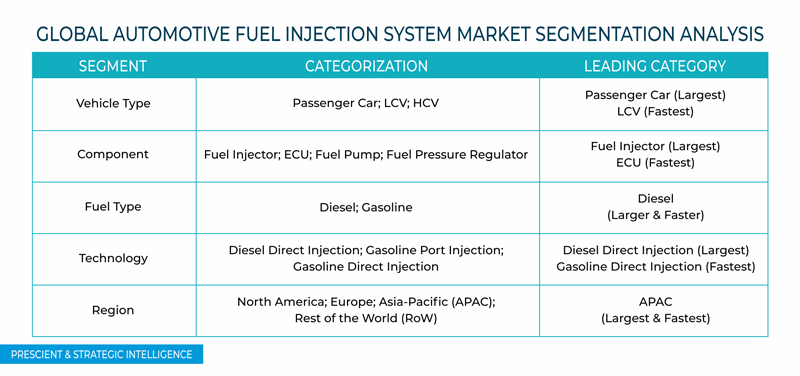Automotive Fuel Injection System Market to Generate Revenue Worth $101.5 Billion by 2022
- Published: September 2016
The global automotive fuel injection system market was valued at $59.6 billion in 2015, and is forecast to reach $101.5 billion by 2022, witnessing a 7.9% CAGR during 2016–2022. Among all vehicle types, passenger car is the largest category in the market, in terms of volume and value.
The increasing urbanization and rising disposable income are the significant growth drivers for the passenger car category in the automotive fuel injection system market. Emerging economies, such as India, China, and Brazil, offer substantial opportunities for further growth of the category in the market.
Increasing Two-Wheeler Market for Fuel Injection System Offers Lucrative Opportunities for Market Players
The increasing two-wheeler market is producing growth opportunities for manufacturers in the automotive fuel injection system market in different countries, such as China, India, and Brazil. The two-wheeler industry in India has witnessed a double-digit volume growth during the past few years. Different countries have different norms and different levels of dependency on various fuels for transportation. For instance, Brazil is highly dependent on ethanol-based transport fuels, which creates the demand for different designs and systems for two-wheelers. It is one of the major markets for two-wheelers, which also makes it an important region for the related components in this industry. The increasing two-wheeler market in these countries is expected to create immense opportunities for the vendors in the market for two-wheeler fuel injection systems.
Stringent Emission Control Norms to Drive Market Growth
Stringent emission control norms are the major factors for the automotive fuel injection system market growth. Due to government regulations in Europe, the average emission level from new cars reduced by 160 grams per kilometer (g/km) during 2006–2012. The regulation requires further reducing the emission levels from new cars to 95 g/km by 2020. In addition, the Organization of the Petroleum Exporting Countries (OPEC) imposed new regulations on its members and restricted the production and export of crude oil. This has had a negative impact on the crude supply to the developing countries, including India, Brazil, and China, which mainly rely on crude imports. This dependence can be reduced by increasing the fuel efficiency of vehicles through the use of fuel injection systems, which would lead to their increased demand.
Segmentation Analysis of Automotive Fuel Injection System Market

The light commercial vehicle (LCV) category is expected to attain the fastest growth in the automotive fuel injection system market, during the forecast period. The lower cost of LCVs when compared to HCVs and increasing adoption of these vehicles for logistics supply chains, especially in the developing economies, is fueling the growth of the LCV fuel injection system market. LCVs have higher a fuel efficiency and are comparatively affordable, which creates a traction for these vehicles in the automotive market.
Diesel direct injection was the largest category in the automotive fuel injection system market in 2015, both in terms of volume and value. Direct-injection diesel engines are currently the most efficient types of combustion engines, with the highest degree of thermal efficiency. Various methods are used to optimize the combustion process in conjunction with diesel direct injection.
Geographical Analysis of Automotive Fuel Injection System Market
Among all regions, APAC held the largest revenue share in the automotive fuel injection system market. Furthermore, the region is projected to witness the fastest growth and also continue dominating the market during the forecast period. Its dominance is majorly due to the increased vehicle production and strict emission norms against emissions. The passenger cars and LCVs in the region accounted for over 50% of the global production. The increasing production in APAC is complemented by the increasing demand for LCVs and passenger cars in the region. The improving economy and living standards in countries such as India and China have resulted in the increased sales volume of vehicles.
Competitive Landscape of Automotive Fuel Injection System Market
The global automotive fuel injection system market is dominated by international players, including Continental AG, Denso Corporation, Robert Bosch GmbH, Delphi Automotive PLC, Magna International Inc., Hitachi Ltd., Mikuni Corporation, SHW AG, and Johnson Electric.
In recent years, several players have been involved in strategic measures, such as product launches, in the automotive fuel injection system market. For instance, in November 2015, Robert Bosch GmbH added 70 new part products to its offerings, which included automotive fuel pumps, oxygen sensors, brakes, engine management sensors, and spark plugs. The company expanded its original equipment (OE) fuel pump catalog for the aftermarket with the addition of 15 new fuel pumps and modules, thereby catering to over 1.3 million domestic and Asian vehicles.
GLOBAL AUTOMOTIVE FUEL INJECTION SYSTEM MARKET SEGMENTATION
By Vehicle Type
- Passenger Car
- Light Commercial Vehicle (LCV)
- Heavy Commercial Vehicle (HCV)
By Component
- Fuel Injector
- Engine Control Unit (ECU)
- Fuel Pump
- Fuel Pressure Regulator
By Fuel Type
- Diesel
- Gasoline
By Technology
- Diesel Direct Injection
- Gasoline Port Injection
- Gasoline Direct Injection
GEOGRAPHICAL SEGMENTATION
- Asia-Pacific
- China
- Japan
- South Korea
- India
- Thailand
- Indonesia
- Australia
- Rest of Asia-Pacific
- Europe
- Germany
- France
- Spain
- The U.K.
- Rest Of Europe
- North America
- U.S.
- Mexico
- Canada
- Rest of the World (RoW)
- Brazil
- Russia
- South Africa
- Rest of RoW